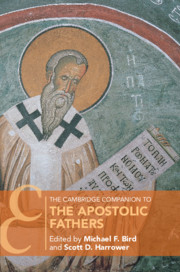Book contents
- The Cambridge Companion to the Apostolic Fathers
- Cambridge Companions to Religion
- The Cambridge Companion to the Apostolic Fathers
- Copyright page
- Contents
- Contributors
- Abbreviations
- Introduction Intriguing and Enigmatic
- 1 The Roman Empire in the Era of the Apostolic Fathers
- 2 The Image of Jews and Judaism in the Apostolic Fathers
- 3 Second-Century Diversity
- 4 The Jesus Tradition in the Apostolic Fathers
- 5 The Text of the New Testament in the Apostolic Fathers
- 6 The Reception of Paul, Peter, and James in the Apostolic Fathers
- 7 Between Ekklēsia and State
- 8 Church, Church Ministry, and Church Order
- 9 The Apostolic Mothers
- 10 1 and 2 Clement
- 11 The Letters of Ignatius
- 12 Polycarp’s Epistle to the Philippians and the Martyrdom of Polycarp
- 13 Didache
- 14 The Epistle of Barnabas
- 15 The Shepherd of Hermas as Early Christian Apocalypse
- 16 The Epistle to Diognetus and the Fragment of Quadratus
- 17 The Fragments of Papias
- Sources Index
- Subject Index
- Cambridge Companions to Religion (continued from page )
- References
5 - The Text of the New Testament in the Apostolic Fathers
Published online by Cambridge University Press: 28 May 2021
- The Cambridge Companion to the Apostolic Fathers
- Cambridge Companions to Religion
- The Cambridge Companion to the Apostolic Fathers
- Copyright page
- Contents
- Contributors
- Abbreviations
- Introduction Intriguing and Enigmatic
- 1 The Roman Empire in the Era of the Apostolic Fathers
- 2 The Image of Jews and Judaism in the Apostolic Fathers
- 3 Second-Century Diversity
- 4 The Jesus Tradition in the Apostolic Fathers
- 5 The Text of the New Testament in the Apostolic Fathers
- 6 The Reception of Paul, Peter, and James in the Apostolic Fathers
- 7 Between Ekklēsia and State
- 8 Church, Church Ministry, and Church Order
- 9 The Apostolic Mothers
- 10 1 and 2 Clement
- 11 The Letters of Ignatius
- 12 Polycarp’s Epistle to the Philippians and the Martyrdom of Polycarp
- 13 Didache
- 14 The Epistle of Barnabas
- 15 The Shepherd of Hermas as Early Christian Apocalypse
- 16 The Epistle to Diognetus and the Fragment of Quadratus
- 17 The Fragments of Papias
- Sources Index
- Subject Index
- Cambridge Companions to Religion (continued from page )
- References
Summary
If the term “the text of the New Testament” refers to the continuous text of any one or several of the Greek writings that constitute the twenty-seven-document collection that became known as the New Testament, then the writings of the Apostolic Fathers are of virtually no use in reconstructing any significant portion of any one of those writings. Indeed, there appear to be only three sources that may assist with that task. In turn these are the first continuous-text manuscripts of New Testament writings that survive in full or in fragmentary form of which to date there are 133 catalogued papyrus fragments, 323 majuscule manuscripts, and 2,936 minuscule manuscripts. Secondly, there are numerous lectionary texts, the majority of which are manuscripts of the Gospels arranged for liturgical use. To date 2,465 Greek manuscripts of this type have been catalogued. Thirdly, there are commentaries on the Greek text where the text is often broken into lines before exposition of the text is provided. The relative importance of these three witnesses to the text of the New Testament follows the order in which the categories have been listed: that is, continuous Greek manuscripts, lectionaries, and then commentaries.
- Type
- Chapter
- Information
- The Cambridge Companion to the Apostolic Fathers , pp. 92 - 118Publisher: Cambridge University PressPrint publication year: 2021



